Log Splitter Rental Market
Log Splitter Rental Market Size and Share Forecast Outlook 2025 to 2035
Log splitter rental market is projected to grow from USD 560.0 million in 2025 to USD 752.6 million by 2035, at a CAGR of 3.0%. Gas-Powered will dominate with a 60.0% market share, while ≤20 ton will lead the capacity segment with a 50.0% share.
Log Splitter Rental Market Forecast and Outlook 2025 to 2035
The log splitter rental market enters a decade of measured expansion across residential, commercial, and industrial applications. The market's progression from USD 560 million in 2025 to USD 750 million by 2035 represents controlled growth, the market will rise at a CAGR of 3% which driven by increasing demand for temporary wood processing solutions and rising adoption of rental models over equipment ownership across heating, construction, and landscaping sectors.
Quick Stats for Log Splitter Rental Market
- Log Splitter Rental Market Value (2025): USD 560 million
- Log Splitter Rental Market Forecast Value (2035): USD 750 million
- Log Splitter Rental Market Forecast CAGR: 3%
- Leading Power Type in Log Splitter Rental Market: Gas-Powered Segment
- Key Growth Regions in Log Splitter Rental Market: South Asia Pacific, East Asia, and North America
- Top Players in Log Splitter Rental Market: Brave, Ariens, Huskee, Champion, Sunbelt
- Where revenue comes from - Now Vs Next (Industry-level view)
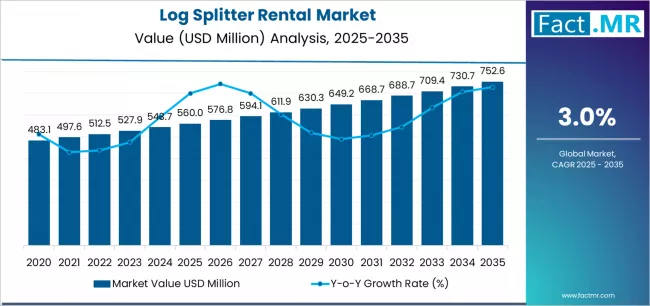
The first half of the decade (2025-2030) will witness the market climbing from USD 560 million to approximately USD 647 million, adding USD 87 million in value, which constitutes 46% of the total forecast growth period. This phase will be characterized by continued adoption of residential and commercial rental applications, driven by seasonal wood processing demands and the growing preference for flexible equipment access without capital investment. Enhanced distribution networks and automated booking systems will become standard expectations rather than premium options.
The latter half (2030-2035) will witness continued growth from USD 647 million to USD 750 million, representing an addition of USD 103 million or 54% of the decade's expansion. This period will be defined by mass market penetration of commercial log splitter rentals, integration with comprehensive equipment rental platforms, and seamless compatibility with existing tool rental infrastructure. The market trajectory signals fundamental shifts in how consumers approach temporary equipment needs and wood processing operations, with participants positioned to benefit from growing demand across multiple application segments and distribution channels.
Log splitter rental operations encompass seasonal equipment distribution systems coordinating inventory allocation, maintenance scheduling, and customer service across diverse residential and commercial wood processing applications. Gas-powered configurations dominate rental fleets through superior portability and independence from electrical infrastructure requirements. Splitting force specifications typically range from 22 to 35 tons for rental units, providing sufficient capacity for hardwood processing while maintaining manageable weight and transportation characteristics.
Residential applications drive primary rental demand through homeowner requirements for firewood preparation, storm cleanup, and property maintenance activities. Seasonal peaks occur during autumn months when homeowners prepare heating fuel supplies and following severe weather events requiring downed tree removal. Weekend rental patterns accommodate consumer work schedules while peak demand periods require strategic inventory positioning across multiple rental locations.
Commercial applications encompass tree service companies, landscaping contractors, and construction site cleanup operations requiring temporary wood processing capabilities for project-specific requirements. Arborist services utilize rental equipment for customer job sites without transporting company-owned equipment between locations. Construction applications include land clearing debris processing and material volume reduction for disposal cost optimization.
| Period | Primary Revenue Buckets | Share | Notes |
|---|---|---|---|
| Today | Residential applications | 55% | Seasonal demand, homeowner focus |
| Commercial applications | 45% | Professional contractors, landscapers | |
| Gas-powered units | 60% | Primary rental preference | |
| Electric units | 30% | Growing efficiency segment | |
| Hydraulic units | 10% | Heavy-duty applications | |
| Future (3-5 yrs) | Enhanced residential rentals | 52-58% | Technology integration, convenience features |
| Expanded commercial solutions | 42-48% | Fleet optimization, extended rental terms | |
| Advanced gas systems | 58-65% | Efficiency improvements, emission compliance | |
| Enhanced electric options | 28-35% | Battery technology, portability gains | |
| Specialized hydraulic units | 8-12% | High-capacity applications | |
| Digital rental platforms | 5-8% | Online booking, usage tracking |
Log Splitter Rental Market Key Takeaways
At-a-Glance Metrics
| Metric | Value |
|---|---|
| Market Value (2025) → | USD 560 million |
| Market Forecast (2035) ↑ | USD 750 million |
| Growth Rate ★ | 3.0% CAGR |
| Leading Power Type → | Gas-Powered Segment |
| Primary User Type → | Residential Segment |
The market demonstrates strong fundamentals with residential applications capturing a dominant share through reliable wood processing capabilities and rental convenience. Residential applications drive primary demand, supported by increasing seasonal wood processing requirements and cost-effective rental alternatives. Geographic expansion remains concentrated in developed markets with established rental infrastructure, while emerging economies show accelerating adoption rates driven by equipment access initiatives and rising rental accessibility standards.
Imperatives for Stakeholders in Log Splitter Rental Market
Design for application versatility, not just splitting capacity
- Offer complete rental packages: log splitter equipment + delivery services + operational training + maintenance support + pickup coordination.
- Preconfigured workflows: rental scheduling, equipment transport, safety protocols, and digital monitoring on usage operations.
Technology readiness for Equipment 4.0
- Real-time usage monitoring analytics, predictive maintenance capabilities, and smart equipment integration (IoT connectivity, performance tracking systems).
Safety-by-design approach
- Automated safety systems, real-time operational monitoring, certified equipment solutions, and paperless maintenance documentation.
Value-based rental models
- Clear base rental rates + transparent service tiers (delivery support, equipment availability, maintenance guarantees); subscriptions for digital services and analytics.
Segmental Analysis
Primary Classification: The market segments by power type into gas-powered, electric, and hydraulic systems, representing the evolution from standard wood processing methods to specialized splitting solutions for comprehensive residential and commercial wood processing optimization.
Secondary Classification: Capacity segmentation divides the market into ≤20 ton (50%), 20-35 ton (35%), and >35 ton (15%) systems, reflecting distinct requirements for processing efficiency, operational capacity, and equipment handling standards.
Tertiary Classification: User segmentation covers residential (55%) and commercial (45%) applications, demonstrating varied operational requirements and rental duration standards.
The segmentation structure reveals technology progression from standard wood processing methods toward specialized log splitter applications with enhanced operational consistency and processing capabilities, while application diversity spans from residential firewood preparation to commercial wood processing requiring precise splitting solutions.
By Power Type, the Gas-Powered Segment Accounts for Dominant Market Share
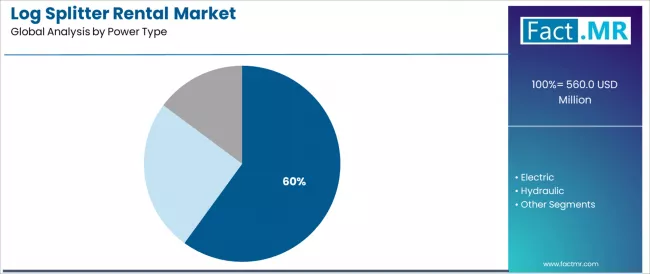
Market Position: Gas-powered applications command the leading position in the log splitter rental market with 60% market share through advanced splitting features, including superior power characteristics, operational reliability, and processing efficiency that enable users to achieve optimal wood processing across diverse residential and commercial splitting applications.
Value Drivers: The segment benefits from user preference for powerful splitting systems that provide consistent performance characteristics, reduced operational complexity, and processing efficiency optimization without requiring electrical infrastructure modifications. Advanced design features enable automated splitting control systems, performance monitoring, and integration with existing wood processing equipment, where operational performance and safety compliance represent critical user requirements.
Competitive Advantages: Gas-powered applications differentiate through proven operational reliability, consistent splitting characteristics, and integration with automated wood processing systems that enhance splitting effectiveness while maintaining optimal performance standards for diverse residential and commercial applications.
Key market characteristics:
- Advanced engine designs with optimized splitting configuration and operational efficiency capabilities
- Enhanced splitting effectiveness, enabling 85-90% operational efficiency consistency with reliable power performance
- Equipment portability compatibility, including automated monitoring systems, control integration, and process optimization for splitting operations
Electric Applications Show Efficiency Market Growth
Electric applications maintain a 30% market position in the log splitter rental market due to their enhanced efficiency properties and residential application characteristics. These systems appeal to users requiring quiet operation with premium positioning for indoor storage and residential applications. Market growth is driven by residential segment expansion, emphasizing clean operation solutions and noise reduction through optimized electric designs.
Hydraulic Applications Demonstrate Heavy-Duty Solutions
Hydraulic applications capture 10% market share through specialized power requirements in commercial operations, heavy-duty splitting, and industrial applications. These operations demand certified hydraulic systems capable of operating with high-capacity wood processing while providing effective power integration and performance capabilities.
By Capacity, ≤20 Ton Systems Show Market Leadership
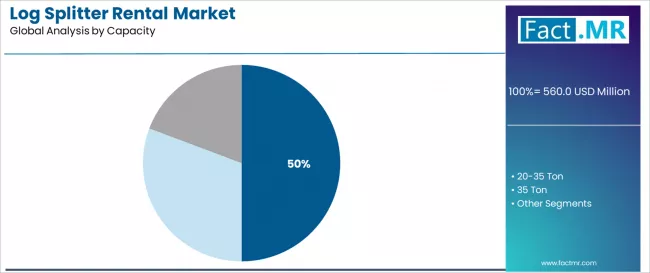
Market Context: ≤20 ton systems demonstrate market leadership in the log splitter rental market with 50% share due to widespread adoption of residential-scale processing systems and increasing focus on operational convenience, equipment handling optimization, and splitting applications that maximize accessibility while maintaining performance standards.
Appeal Factors: Users prioritize equipment manageability, operational simplicity, and integration with existing wood processing infrastructure that enables coordinated splitting operations across multiple residential applications. The segment benefits from substantial equipment investment and modernization programs that emphasize the acquisition of manageable systems for processing optimization and user accessibility applications.
Growth Drivers: Residential facility expansion programs incorporate moderate-capacity splitting as standard equipment for wood processing operations, while usage growth increases demand for consistent performance capabilities that comply with safety standards and minimize operational complexity.
20-35 Ton Systems Maintain Commercial Demand
20-35 ton systems capture 35% market share through comprehensive processing requirements in commercial facilities, professional operations, and mid-scale applications requiring reliable splitting systems capable of handling substantial volumes while providing effective wood processing and operational performance capabilities.
>35 Ton Systems Show Specialized Growth
35 ton systems account for 15% market share, including industrial operations, large-scale processing, and specialized applications requiring heavy-duty splitting solutions for operational optimization and high-volume processing.
By User Type, Residential Applications Show Market Leadership
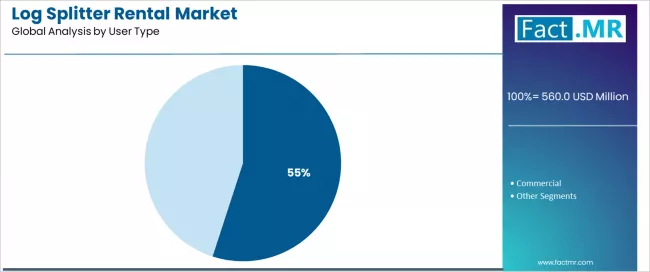
Market Context: Residential applications demonstrate market leadership in the log splitter rental market with 55% share due to widespread adoption of seasonal wood processing and increasing focus on cost-effective equipment access, rental convenience, and homeowner applications that maximize value while maintaining processing standards.
Appeal Factors: Homeowners prioritize rental convenience, seasonal accessibility, and integration with existing home maintenance practices that enables coordinated wood processing across multiple seasonal applications. The segment benefits from substantial rental service investment and accessibility programs that emphasize the acquisition of residential-friendly systems for processing optimization and homeowner convenience applications.
Growth Drivers: Residential heating expansion programs incorporate seasonal wood processing as standard preparation for heating operations, while homeowner growth increases demand for convenient rental capabilities that comply with safety standards and minimize equipment storage complexity.
Application dynamics include:
- Strong growth in residential facilities and seasonal operations requiring reliable processing capabilities
- Increasing adoption in cost optimization and rental convenience applications for homeowners
- Rising integration with automated rental systems for operational optimization and access assurance
Commercial Applications Maintain Professional Demand
Commercial applications capture 45% market share through comprehensive processing requirements in professional facilities, contractor operations, and business applications. These operations demand reliable rental systems capable of handling professional volumes while providing effective wood processing management and operational performance capabilities.
What are the Drivers, Restraints, and Key Trends of the Log Splitter Rental Market?
| Category | Factor | Impact | Why It Matters |
|---|---|---|---|
| Driver | Seasonal wood processing demand & cost efficiency (heating preparation, firewood processing) | ★★★★★ | Large-scale residential markets require efficient, cost-effective wood processing solutions with convenient access and reliable performance across seasonal applications. |
| Driver | Commercial contractor growth & equipment flexibility | ★★★★★ | Drives demand for specialized processing solutions and flexible rental capabilities; suppliers providing professional-grade equipment gain competitive advantage. |
| Driver | Rental model preference & equipment access (capital avoidance, storage elimination) | ★★★★☆ | Users need flexible equipment solutions; demand for rental formats expanding addressable market segments. |
| Restraint | Equipment transport complexity & delivery requirements | ★★★★☆ | Small rental operators face logistics pressure; increases cost sensitivity and affects service consistency in remote markets. |
| Restraint | Seasonal demand variation & utilization cycles | ★★★☆☆ | Efficiency-focused operations face challenges with equipment utilization and revenue consistency, limiting profitability in off-peak periods. |
| Trend | Digital rental platforms & smart booking (connected equipment management) | ★★★★★ | Growing demand for connected rental equipment; digital integration becomes core value proposition in modern rental segments. |
| Trend | Battery technology advancement & electric efficiency | ★★★★☆ | Equipment development drives demand for clean operation solutions; electric capabilities drive competition toward efficiency optimization. |
Analysis of the Log Splitter Rental Market by Key Country
The log splitter rental market demonstrates varied regional dynamics with growth leaders including India (3.6% growth rate) and China (3.2% growth rate) driving expansion through equipment rental initiatives and residential capacity development. Steady Performers encompass USA (3.0% growth rate), South Korea (2.9% growth rate), and Germany (2.8% growth rate), benefiting from established rental industries and advanced equipment adoption. Mature Markets feature UK (2.7% growth rate) and Japan (2.5% growth rate), where equipment technology advancement and safety standardization requirements support consistent growth patterns.
Regional synthesis reveals South Asian and East Asian markets leading adoption through rental expansion and residential development, while Western countries maintain steady expansion supported by technology advancement and operational standardization requirements. Emerging markets show strong growth driven by equipment access applications and rental modernization trends.
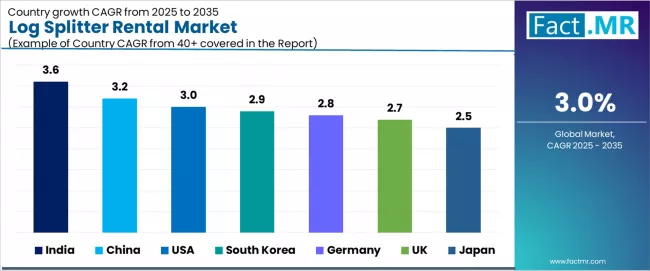
| Region/Country | 2025-2035 Growth | How to win | What to watch out |
|---|---|---|---|
| India | 3.6% | Focus on cost-effective rental solutions | Infrastructure challenges; equipment availability |
| China | 3.2% | Lead with high-volume rental systems | Environmental regulations; equipment complexity |
| USA | 3.0% | Provide safety-compliant applications | Equipment regulations; transport requirements |
| South Korea | 2.9% | Push digital integration solutions | Technology saturation; equipment costs |
| Germany | 2.8% | Premium quality positioning | Over-specification; regulatory compliance |
| UK | 2.7% | Offer reliable rental services | Market maturity; seasonal variations |
| Japan | 2.5% | Premium efficiency positioning | Equipment precision; market saturation |
India Drives Fastest Market Growth
India establishes fastest market growth through aggressive equipment rental programs and comprehensive residential development, integrating advanced log splitter rental as standard components in wood processing and residential heating installations. The country's 3.6% growth rate reflects government initiatives promoting equipment access modernization and residential development capabilities that mandate the use of rental equipment systems in processing facilities. Growth concentrates in major urban centers, including Delhi, Mumbai, and Chennai, where equipment rental development showcases integrated processing systems that appeal to consumers seeking advanced wood processing optimization capabilities and operational equipment applications.
Indian rental operators are developing cost-effective equipment solutions that combine domestic rental advantages with advanced operational features, including automated delivery systems and enhanced reliability capabilities. Distribution channels through equipment rental suppliers and residential service distributors expand market access, while government support for equipment development supports adoption across diverse consumer segments.
Strategic Market Indicators:
- Residential applications leading adoption with 62% deployment rate in wood processing and heating sectors
- Government equipment programs providing funding for domestic rental technology development
- Local rental providers capturing 38% market share through competitive pricing and localized service support
- Export market development for cost-effective rental solutions targeting emerging equipment markets
China Emerges as High-Volume Market
In Guangdong, Jiangsu, and Zhejiang provinces, residential facilities and commercial operations are implementing advanced log splitter rental as standard equipment for processing optimization and operational wood processing enhancement, driven by increasing government residential investment and equipment modernization programs that emphasize the importance of rental capabilities. The market holds a 3.2% growth rate, supported by government equipment initiatives and residential infrastructure development programs that promote advanced rental systems for processing facilities. Chinese operators are adopting rental systems that provide consistent operational performance and safety compliance features, particularly appealing in residential regions where processing efficiency and equipment standards represent critical operational requirements.
Market expansion benefits from growing residential processing capabilities and equipment integration agreements that enable domestic provision of advanced rental systems for wood processing applications. Technology adoption follows patterns established in equipment rental, where efficiency and performance drive service decisions and operational deployment.
USA Shows Safety-Compliant Market Development
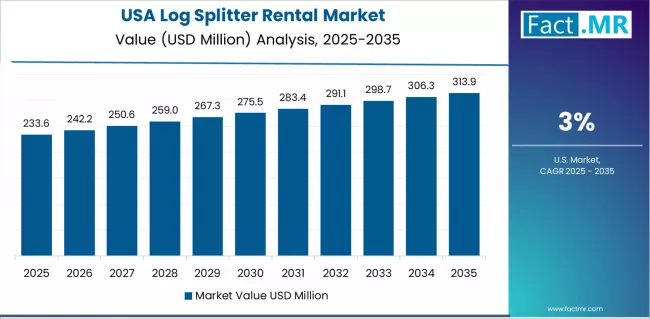
USA establishes safety-compliant market development through comprehensive equipment rental programs and established safety infrastructure, integrating log splitter systems across residential facilities and commercial applications. The country's 3.0% growth rate reflects mature equipment rental industry relationships and established rental adoption that supports widespread use of splitting systems in wood processing facilities and safety-compliant operations. Growth concentrates in major rental centers, including Texas, California, and Pennsylvania, where equipment rental technology showcases mature system deployment that appeals to consumers seeking proven safety capabilities and operational efficiency applications.
American rental operators leverage established distribution networks and comprehensive safety capabilities, including compliance programs and technical support that create customer relationships and operational advantages. The market benefits from mature safety standards and equipment requirements that support rental system use while supporting technology advancement and operational optimization.
South Korea Shows Digital Application Development
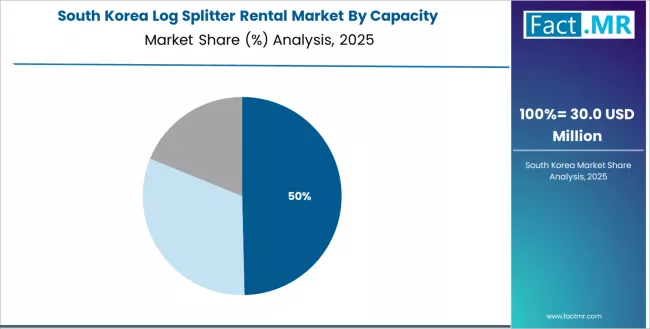
South Korea establishes digital application development through comprehensive rental modernization and technology integration, integrating log splitter systems across residential facilities and specialized commercial applications. The country's 2.9% growth rate reflects growing digital investment and increasing adoption of rental technology that supports expanding use of splitting systems in Korean residential facilities. Growth concentrates in major urban areas, including Seoul metropolitan area, Busan, and Ulsan, where equipment rental technology development showcases integrated processing systems that appeal to Korean consumers seeking advanced rental solutions with digital efficiency compatibility.
Korean rental operators focus on maintaining quality standards while adopting digital rental efficiency, creating demand for systems that balance performance with operational advantages. The market benefits from strong digital infrastructure and growing technology opportunities that support rental equipment adoption while maintaining quality standards important to Korean residential applications.
Germany Demonstrates Premium Quality Focus
Germany's advanced equipment rental market demonstrates refined log splitter integration with documented operational effectiveness in premium wood processing applications and modern facility installations through integration with existing quality systems and equipment infrastructure. The country maintains a 2.8% growth rate, leveraging traditional quality expertise and precision systems integration in rental technology. Equipment rental centers, including North Rhine-Westphalia, Bavaria, and Baden-Württemberg, showcase premium installations where splitting systems integrate with traditional quality platforms and modern equipment management systems to optimize processing operations and maintain equipment quality profiles.
German rental operators prioritize equipment precision and quality consistency in log splitter development, creating demand for premium systems with advanced features, including quality monitoring and automated equipment systems. The market benefits from established quality infrastructure and commitment to equipment standards that provide long-term operational benefits and compliance with traditional quality processing methods.
UK Demonstrates Reliable Service Focus
UK's established equipment rental market demonstrates refined log splitter integration with documented operational effectiveness in reliable wood processing applications and modern facility installations through integration with existing service systems and equipment infrastructure. The country maintains a 2.7% growth rate, leveraging traditional service expertise and precision systems integration in rental technology. Equipment rental centers, including London, Manchester, and Birmingham, showcase reliable installations where splitting systems integrate with traditional service platforms and modern equipment management systems to optimize processing operations and maintain equipment service profiles.
UK rental operators prioritize equipment reliability and service consistency in log splitter development, creating demand for dependable systems with advanced features, including service monitoring and automated equipment systems. The market benefits from established service infrastructure and commitment to equipment standards that provide long-term operational benefits and compliance with traditional quality processing methods.
Japan Demonstrates Premium Efficiency Focus
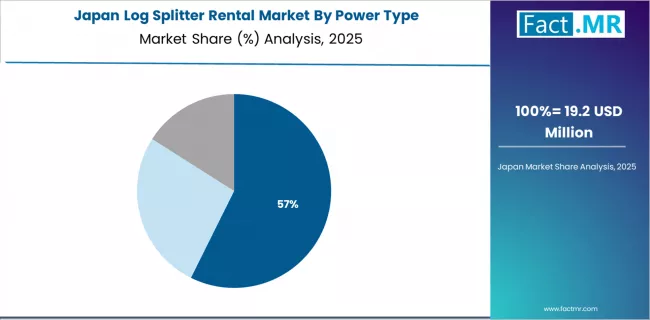
Japan's advanced equipment rental market demonstrates refined log splitter integration with documented operational effectiveness in premium wood processing applications and modern facility installations through integration with existing efficiency systems and equipment infrastructure. The country maintains a 2.5% growth rate, leveraging traditional efficiency expertise and precision systems integration in rental technology. Equipment rental centers, including Tokyo, Osaka, and Nagoya, showcase premium installations where splitting systems integrate with traditional efficiency platforms and modern equipment management systems to optimize processing operations and maintain equipment efficiency profiles.
Japanese rental operators prioritize equipment precision and efficiency consistency in log splitter development, creating demand for premium systems with advanced features, including efficiency monitoring and automated equipment systems. The market benefits from established efficiency infrastructure and commitment to equipment standards that provide long-term operational benefits and compliance with traditional quality processing methods.
Europe Market Split by Country
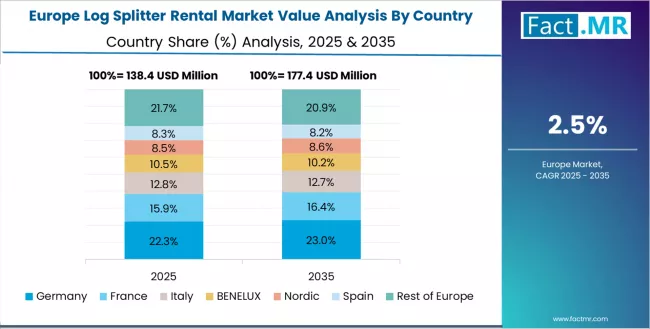
The European log splitter rental market is projected to represent a significant portion of global consumption, with strong regional distribution across major economies. Germany is expected to maintain its leadership position with USD 110.0 million in 2025, accounting for substantial European market share, supported by its advanced equipment rental infrastructure and major industrial centers.
United Kingdom follows with USD 85.0 million, representing significant European market share in 2025, driven by comprehensive rental programs and equipment technology development initiatives. France holds USD 70.0 million through specialized processing applications and equipment compliance requirements. Italy commands USD 55.0 million, while Spain accounts for USD 45.0 million in 2025. The rest of Europe region maintains USD 115.0 million, attributed to increasing rental system adoption in Nordic countries and emerging equipment facilities implementing processing modernization programs.
Competitive Landscape of the Log Splitter Rental Market
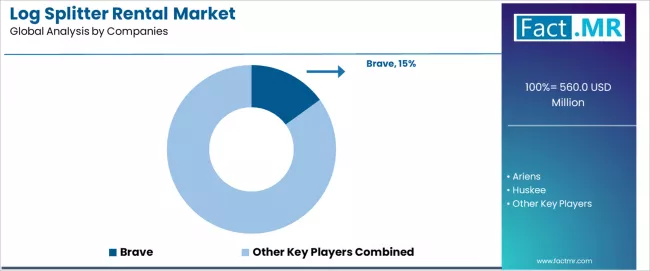
- Structure: ~15-20 active players; top 3-4 hold ~35-40% by revenue, with Brave leading at 15% market share.
- Leadership is maintained through: regional rental networks, specialized equipment systems, and comprehensive service capabilities (multi-application versatility + delivery support + maintenance compliance).
- What's commoditizing: standard equipment rental and basic delivery systems.
- Margin Opportunities: specialized commercial applications, IoT-enabled monitoring, and comprehensive service contracts (predictive maintenance, equipment management, compliance documentation).
| Stakeholder | What they actually control | Typical strengths | Typical blind spots |
|---|---|---|---|
| Global platforms | Distribution networks, broad equipment portfolios, rental facilities | Proven reliability, multi-region support, comprehensive service | Technology refresh cycles; customer retention dependency |
| Technology innovators | R&D capabilities; advanced equipment systems; digital interfaces | Latest technology first; attractive ROI on specialized applications | Service density outside core regions; customization complexity |
| Regional specialists | Local sourcing, fast delivery, nearby technical support | "Close to site" support; pragmatic pricing; local regulations | Technology gaps; talent retention in engineering |
| Application-focused ecosystems | Industry expertise, technical support, specialized solutions | Lowest application variation; comprehensive industry support | Scaling costs if overpromised; technology obsolescence |
| Service specialists | Rental programs, equipment supply, technical training | Win service-intensive applications; flexible support | Scalability limitations; narrow market focus |
Key Players in the Log Splitter Rental Market
- Brave
- Ariens
- Huskee
- Champion
- Sunbelt
- Yardmax
- DR Power
- NorthStar
- Boss Industrial
- Iron & Oak
- Herc
- Toro
- SpeeCo
- Cub Cadet
- John Deere
Scope of the Report
| Items | Values |
|---|---|
| Quantitative Units (2025) | USD 560 million |
| Power Type | Gas-Powered, Electric, Hydraulic |
| Capacity | ≤20 Ton, 20-35 Ton, >35 Ton |
| User Type | Residential, Commercial |
| Regions Covered | East Asia, Western Europe, South Asia Pacific, North America, Latin America, Middle East & Africa |
| Countries Covered | China, Germany, United States, Japan, India, South Korea, United Kingdom, and 25+ additional countries |
| Key Companies Profiled | Brave, Ariens, Huskee, Champion, Sunbelt, Yardmax, DR Power, NorthStar, Boss Industrial, Iron & Oak |
| Additional Attributes | Dollar sales by power type and user categories, regional adoption trends across East Asia, Western Europe, and South Asia Pacific, competitive landscape with equipment suppliers and rental providers, consumer preferences for processing reliability and operational convenience, integration with rental platforms and equipment monitoring systems, innovations in equipment technology and rental enhancement, and development of advanced log splitter solutions with enhanced performance and processing optimization capabilities. |
Log Splitter Rental Market by Segments
-
Power Type :
- Gas-Powered
- Electric
- Hydraulic
-
Capacity :
- ≤20 Ton
- 20-35 Ton
- 35 Ton
-
User Type :
- Residential
- Commercial
-
Region :
- East Asia
- China
- Japan
- South Korea
- South Asia Pacific
- India
- ASEAN
- Australia & New Zealand
- Rest of South Asia Pacific
- Western Europe
- Germany
- France
- United Kingdom
- Italy
- Spain
- Rest of Western Europe
- North America
- United States
- Canada
- Mexico
- Latin America
- Brazil
- Rest of Latin America
- Middle East & Africa
- GCC Countries
- South Africa
- Rest of Middle East & Africa
- East Asia
Table of Content
- Executive Summary
- Global Market Outlook
- Demand to side Trends
- Supply to side Trends
- Technology Roadmap Analysis
- Analysis and Recommendations
- Market Overview
- Market Coverage / Taxonomy
- Market Definition / Scope / Limitations
- Market Background
- Market Dynamics
- Drivers
- Restraints
- Opportunity
- Trends
- Scenario Forecast
- Demand in Optimistic Scenario
- Demand in Likely Scenario
- Demand in Conservative Scenario
- Opportunity Map Analysis
- Product Life Cycle Analysis
- Supply Chain Analysis
- Investment Feasibility Matrix
- Value Chain Analysis
- PESTLE and Porter’s Analysis
- Regulatory Landscape
- Regional Parent Market Outlook
- Production and Consumption Statistics
- Import and Export Statistics
- Market Dynamics
- Global Market Analysis 2020 to 2024 and Forecast, 2025 to 2035
- Historical Market Size Value (USD Million) Analysis, 2020 to 2024
- Current and Future Market Size Value (USD Million) Projections, 2025 to 2035
- Y to o to Y Growth Trend Analysis
- Absolute $ Opportunity Analysis
- Global Market Pricing Analysis 2020 to 2024 and Forecast 2025 to 2035
- Global Market Analysis 2020 to 2024 and Forecast 2025 to 2035, By Power Type
- Introduction / Key Findings
- Historical Market Size Value (USD Million) Analysis By Power Type , 2020 to 2024
- Current and Future Market Size Value (USD Million) Analysis and Forecast By Power Type , 2025 to 2035
- Gas-Powered
- Electric
- Hydraulic
- Y to o to Y Growth Trend Analysis By Power Type , 2020 to 2024
- Absolute $ Opportunity Analysis By Power Type , 2025 to 2035
- Global Market Analysis 2020 to 2024 and Forecast 2025 to 2035, By Capacity
- Introduction / Key Findings
- Historical Market Size Value (USD Million) Analysis By Capacity, 2020 to 2024
- Current and Future Market Size Value (USD Million) Analysis and Forecast By Capacity, 2025 to 2035
- ≤20 Ton
- 20-35 Ton
- 35 Ton
- Y to o to Y Growth Trend Analysis By Capacity, 2020 to 2024
- Absolute $ Opportunity Analysis By Capacity, 2025 to 2035
- Global Market Analysis 2020 to 2024 and Forecast 2025 to 2035, By User Type
- Introduction / Key Findings
- Historical Market Size Value (USD Million) Analysis By User Type, 2020 to 2024
- Current and Future Market Size Value (USD Million) Analysis and Forecast By User Type, 2025 to 2035
- Residential
- Commercial
- Y to o to Y Growth Trend Analysis By User Type, 2020 to 2024
- Absolute $ Opportunity Analysis By User Type, 2025 to 2035
- Global Market Analysis 2020 to 2024 and Forecast 2025 to 2035, By Region
- Introduction
- Historical Market Size Value (USD Million) Analysis By Region, 2020 to 2024
- Current Market Size Value (USD Million) Analysis and Forecast By Region, 2025 to 2035
- North America
- Latin America
- Western Europe
- Eastern Europe
- East Asia
- South Asia and Pacific
- Middle East & Africa
- Market Attractiveness Analysis By Region
- North America Market Analysis 2020 to 2024 and Forecast 2025 to 2035, By Country
- Historical Market Size Value (USD Million) Trend Analysis By Market Taxonomy, 2020 to 2024
- Market Size Value (USD Million) Forecast By Market Taxonomy, 2025 to 2035
- By Country
- USA
- Canada
- Mexico
- By Power Type
- By Capacity
- By User Type
- By Country
- Market Attractiveness Analysis
- By Country
- By Power Type
- By Capacity
- By User Type
- Key Takeaways
- Latin America Market Analysis 2020 to 2024 and Forecast 2025 to 2035, By Country
- Historical Market Size Value (USD Million) Trend Analysis By Market Taxonomy, 2020 to 2024
- Market Size Value (USD Million) Forecast By Market Taxonomy, 2025 to 2035
- By Country
- Brazil
- Chile
- Rest of Latin America
- By Power Type
- By Capacity
- By User Type
- By Country
- Market Attractiveness Analysis
- By Country
- By Power Type
- By Capacity
- By User Type
- Key Takeaways
- Western Europe Market Analysis 2020 to 2024 and Forecast 2025 to 2035, By Country
- Historical Market Size Value (USD Million) Trend Analysis By Market Taxonomy, 2020 to 2024
- Market Size Value (USD Million) Forecast By Market Taxonomy, 2025 to 2035
- By Country
- Germany
- UK
- Italy
- Spain
- France
- Nordic
- BENELUX
- Rest of Western Europe
- By Power Type
- By Capacity
- By User Type
- By Country
- Market Attractiveness Analysis
- By Country
- By Power Type
- By Capacity
- By User Type
- Key Takeaways
- Eastern Europe Market Analysis 2020 to 2024 and Forecast 2025 to 2035, By Country
- Historical Market Size Value (USD Million) Trend Analysis By Market Taxonomy, 2020 to 2024
- Market Size Value (USD Million) Forecast By Market Taxonomy, 2025 to 2035
- By Country
- Russia
- Poland
- Hungary
- Balkan & Baltic
- Rest of Eastern Europe
- By Power Type
- By Capacity
- By User Type
- By Country
- Market Attractiveness Analysis
- By Country
- By Power Type
- By Capacity
- By User Type
- Key Takeaways
- East Asia Market Analysis 2020 to 2024 and Forecast 2025 to 2035, By Country
- Historical Market Size Value (USD Million) Trend Analysis By Market Taxonomy, 2020 to 2024
- Market Size Value (USD Million) Forecast By Market Taxonomy, 2025 to 2035
- By Country
- China
- Japan
- South Korea
- By Power Type
- By Capacity
- By User Type
- By Country
- Market Attractiveness Analysis
- By Country
- By Power Type
- By Capacity
- By User Type
- Key Takeaways
- South Asia and Pacific Market Analysis 2020 to 2024 and Forecast 2025 to 2035, By Country
- Historical Market Size Value (USD Million) Trend Analysis By Market Taxonomy, 2020 to 2024
- Market Size Value (USD Million) Forecast By Market Taxonomy, 2025 to 2035
- By Country
- India
- ASEAN
- Australia & New Zealand
- Rest of South Asia and Pacific
- By Power Type
- By Capacity
- By User Type
- By Country
- Market Attractiveness Analysis
- By Country
- By Power Type
- By Capacity
- By User Type
- Key Takeaways
- Middle East & Africa Market Analysis 2020 to 2024 and Forecast 2025 to 2035, By Country
- Historical Market Size Value (USD Million) Trend Analysis By Market Taxonomy, 2020 to 2024
- Market Size Value (USD Million) Forecast By Market Taxonomy, 2025 to 2035
- By Country
- Kingdom of Saudi Arabia
- Other GCC Countries
- Turkiye
- South Africa
- Other African Union
- Rest of Middle East & Africa
- By Power Type
- By Capacity
- By User Type
- By Country
- Market Attractiveness Analysis
- By Country
- By Power Type
- By Capacity
- By User Type
- Key Takeaways
- Key Countries Market Analysis
- USA
- Pricing Analysis
- Market Share Analysis, 2024
- By Power Type
- By Capacity
- By User Type
- Canada
- Pricing Analysis
- Market Share Analysis, 2024
- By Power Type
- By Capacity
- By User Type
- Mexico
- Pricing Analysis
- Market Share Analysis, 2024
- By Power Type
- By Capacity
- By User Type
- Brazil
- Pricing Analysis
- Market Share Analysis, 2024
- By Power Type
- By Capacity
- By User Type
- Chile
- Pricing Analysis
- Market Share Analysis, 2024
- By Power Type
- By Capacity
- By User Type
- Germany
- Pricing Analysis
- Market Share Analysis, 2024
- By Power Type
- By Capacity
- By User Type
- UK
- Pricing Analysis
- Market Share Analysis, 2024
- By Power Type
- By Capacity
- By User Type
- Italy
- Pricing Analysis
- Market Share Analysis, 2024
- By Power Type
- By Capacity
- By User Type
- Spain
- Pricing Analysis
- Market Share Analysis, 2024
- By Power Type
- By Capacity
- By User Type
- France
- Pricing Analysis
- Market Share Analysis, 2024
- By Power Type
- By Capacity
- By User Type
- India
- Pricing Analysis
- Market Share Analysis, 2024
- By Power Type
- By Capacity
- By User Type
- ASEAN
- Pricing Analysis
- Market Share Analysis, 2024
- By Power Type
- By Capacity
- By User Type
- Australia & New Zealand
- Pricing Analysis
- Market Share Analysis, 2024
- By Power Type
- By Capacity
- By User Type
- China
- Pricing Analysis
- Market Share Analysis, 2024
- By Power Type
- By Capacity
- By User Type
- Japan
- Pricing Analysis
- Market Share Analysis, 2024
- By Power Type
- By Capacity
- By User Type
- South Korea
- Pricing Analysis
- Market Share Analysis, 2024
- By Power Type
- By Capacity
- By User Type
- Russia
- Pricing Analysis
- Market Share Analysis, 2024
- By Power Type
- By Capacity
- By User Type
- Poland
- Pricing Analysis
- Market Share Analysis, 2024
- By Power Type
- By Capacity
- By User Type
- Hungary
- Pricing Analysis
- Market Share Analysis, 2024
- By Power Type
- By Capacity
- By User Type
- Kingdom of Saudi Arabia
- Pricing Analysis
- Market Share Analysis, 2024
- By Power Type
- By Capacity
- By User Type
- Turkiye
- Pricing Analysis
- Market Share Analysis, 2024
- By Power Type
- By Capacity
- By User Type
- South Africa
- Pricing Analysis
- Market Share Analysis, 2024
- By Power Type
- By Capacity
- By User Type
- USA
- Market Structure Analysis
- Competition Dashboard
- Competition Benchmarking
- Market Share Analysis of Top Players
- By Regional
- By Power Type
- By Capacity
- By User Type
- Competition Analysis
- Competition Deep Dive
- Brave
- Overview
- Product Portfolio
- Profitability by Market Segments (Product/Age /Sales Channel/Region)
- Sales Footprint
- Strategy Overview
- Marketing Strategy
- Product Strategy
- Channel Strategy
- Ariens
- Huskee
- Champion
- Sunbelt
- Yardmax
- DR Power
- NorthStar
- Boss Industrial
- Iron & Oak
- Herc
- Toro
- SpeeCo
- Cub Cadet
- John Deere
- Brave
- Competition Deep Dive
- Assumptions & Acronyms Used
- Research Methodology
List Of Table
- Table 1: Global Market Value (USD Million) Forecast by Region, 2020 to 2035
- Table 2: Global Market Value (USD Million) Forecast by Power Type , 2020 to 2035
- Table 3: Global Market Value (USD Million) Forecast by Capacity, 2020 to 2035
- Table 4: Global Market Value (USD Million) Forecast by User Type, 2020 to 2035
- Table 5: North America Market Value (USD Million) Forecast by Country, 2020 to 2035
- Table 6: North America Market Value (USD Million) Forecast by Power Type , 2020 to 2035
- Table 7: North America Market Value (USD Million) Forecast by Capacity, 2020 to 2035
- Table 8: North America Market Value (USD Million) Forecast by User Type, 2020 to 2035
- Table 9: Latin America Market Value (USD Million) Forecast by Country, 2020 to 2035
- Table 10: Latin America Market Value (USD Million) Forecast by Power Type , 2020 to 2035
- Table 11: Latin America Market Value (USD Million) Forecast by Capacity, 2020 to 2035
- Table 12: Latin America Market Value (USD Million) Forecast by User Type, 2020 to 2035
- Table 13: Western Europe Market Value (USD Million) Forecast by Country, 2020 to 2035
- Table 14: Western Europe Market Value (USD Million) Forecast by Power Type , 2020 to 2035
- Table 15: Western Europe Market Value (USD Million) Forecast by Capacity, 2020 to 2035
- Table 16: Western Europe Market Value (USD Million) Forecast by User Type, 2020 to 2035
- Table 17: Eastern Europe Market Value (USD Million) Forecast by Country, 2020 to 2035
- Table 18: Eastern Europe Market Value (USD Million) Forecast by Power Type , 2020 to 2035
- Table 19: Eastern Europe Market Value (USD Million) Forecast by Capacity, 2020 to 2035
- Table 20: Eastern Europe Market Value (USD Million) Forecast by User Type, 2020 to 2035
- Table 21: East Asia Market Value (USD Million) Forecast by Country, 2020 to 2035
- Table 22: East Asia Market Value (USD Million) Forecast by Power Type , 2020 to 2035
- Table 23: East Asia Market Value (USD Million) Forecast by Capacity, 2020 to 2035
- Table 24: East Asia Market Value (USD Million) Forecast by User Type, 2020 to 2035
- Table 25: South Asia and Pacific Market Value (USD Million) Forecast by Country, 2020 to 2035
- Table 26: South Asia and Pacific Market Value (USD Million) Forecast by Power Type , 2020 to 2035
- Table 27: South Asia and Pacific Market Value (USD Million) Forecast by Capacity, 2020 to 2035
- Table 28: South Asia and Pacific Market Value (USD Million) Forecast by User Type, 2020 to 2035
- Table 29: Middle East & Africa Market Value (USD Million) Forecast by Country, 2020 to 2035
- Table 30: Middle East & Africa Market Value (USD Million) Forecast by Power Type , 2020 to 2035
- Table 31: Middle East & Africa Market Value (USD Million) Forecast by Capacity, 2020 to 2035
- Table 32: Middle East & Africa Market Value (USD Million) Forecast by User Type, 2020 to 2035
List Of Figures
- Figure 1: Global Market Pricing Analysis
- Figure 2: Global Market Value (USD Million) Forecast 2020-2035
- Figure 3: Global Market Value Share and BPS Analysis by Power Type , 2025 and 2035
- Figure 4: Global Market Y to o to Y Growth Comparison by Power Type , 2025-2035
- Figure 5: Global Market Attractiveness Analysis by Power Type
- Figure 6: Global Market Value Share and BPS Analysis by Capacity, 2025 and 2035
- Figure 7: Global Market Y to o to Y Growth Comparison by Capacity, 2025-2035
- Figure 8: Global Market Attractiveness Analysis by Capacity
- Figure 9: Global Market Value Share and BPS Analysis by User Type, 2025 and 2035
- Figure 10: Global Market Y to o to Y Growth Comparison by User Type, 2025-2035
- Figure 11: Global Market Attractiveness Analysis by User Type
- Figure 12: Global Market Value (USD Million) Share and BPS Analysis by Region, 2025 and 2035
- Figure 13: Global Market Y to o to Y Growth Comparison by Region, 2025-2035
- Figure 14: Global Market Attractiveness Analysis by Region
- Figure 15: North America Market Incremental Dollar Opportunity, 2025-2035
- Figure 16: Latin America Market Incremental Dollar Opportunity, 2025-2035
- Figure 17: Western Europe Market Incremental Dollar Opportunity, 2025-2035
- Figure 18: Eastern Europe Market Incremental Dollar Opportunity, 2025-2035
- Figure 19: East Asia Market Incremental Dollar Opportunity, 2025-2035
- Figure 20: South Asia and Pacific Market Incremental Dollar Opportunity, 2025-2035
- Figure 21: Middle East & Africa Market Incremental Dollar Opportunity, 2025-2035
- Figure 22: North America Market Value Share and BPS Analysis by Country, 2025 and 2035
- Figure 23: North America Market Value Share and BPS Analysis by Power Type , 2025 and 2035
- Figure 24: North America Market Y to o to Y Growth Comparison by Power Type , 2025-2035
- Figure 25: North America Market Attractiveness Analysis by Power Type
- Figure 26: North America Market Value Share and BPS Analysis by Capacity, 2025 and 2035
- Figure 27: North America Market Y to o to Y Growth Comparison by Capacity, 2025-2035
- Figure 28: North America Market Attractiveness Analysis by Capacity
- Figure 29: North America Market Value Share and BPS Analysis by User Type, 2025 and 2035
- Figure 30: North America Market Y to o to Y Growth Comparison by User Type, 2025-2035
- Figure 31: North America Market Attractiveness Analysis by User Type
- Figure 32: Latin America Market Value Share and BPS Analysis by Country, 2025 and 2035
- Figure 33: Latin America Market Value Share and BPS Analysis by Power Type , 2025 and 2035
- Figure 34: Latin America Market Y to o to Y Growth Comparison by Power Type , 2025-2035
- Figure 35: Latin America Market Attractiveness Analysis by Power Type
- Figure 36: Latin America Market Value Share and BPS Analysis by Capacity, 2025 and 2035
- Figure 37: Latin America Market Y to o to Y Growth Comparison by Capacity, 2025-2035
- Figure 38: Latin America Market Attractiveness Analysis by Capacity
- Figure 39: Latin America Market Value Share and BPS Analysis by User Type, 2025 and 2035
- Figure 40: Latin America Market Y to o to Y Growth Comparison by User Type, 2025-2035
- Figure 41: Latin America Market Attractiveness Analysis by User Type
- Figure 42: Western Europe Market Value Share and BPS Analysis by Country, 2025 and 2035
- Figure 43: Western Europe Market Value Share and BPS Analysis by Power Type , 2025 and 2035
- Figure 44: Western Europe Market Y to o to Y Growth Comparison by Power Type , 2025-2035
- Figure 45: Western Europe Market Attractiveness Analysis by Power Type
- Figure 46: Western Europe Market Value Share and BPS Analysis by Capacity, 2025 and 2035
- Figure 47: Western Europe Market Y to o to Y Growth Comparison by Capacity, 2025-2035
- Figure 48: Western Europe Market Attractiveness Analysis by Capacity
- Figure 49: Western Europe Market Value Share and BPS Analysis by User Type, 2025 and 2035
- Figure 50: Western Europe Market Y to o to Y Growth Comparison by User Type, 2025-2035
- Figure 51: Western Europe Market Attractiveness Analysis by User Type
- Figure 52: Eastern Europe Market Value Share and BPS Analysis by Country, 2025 and 2035
- Figure 53: Eastern Europe Market Value Share and BPS Analysis by Power Type , 2025 and 2035
- Figure 54: Eastern Europe Market Y to o to Y Growth Comparison by Power Type , 2025-2035
- Figure 55: Eastern Europe Market Attractiveness Analysis by Power Type
- Figure 56: Eastern Europe Market Value Share and BPS Analysis by Capacity, 2025 and 2035
- Figure 57: Eastern Europe Market Y to o to Y Growth Comparison by Capacity, 2025-2035
- Figure 58: Eastern Europe Market Attractiveness Analysis by Capacity
- Figure 59: Eastern Europe Market Value Share and BPS Analysis by User Type, 2025 and 2035
- Figure 60: Eastern Europe Market Y to o to Y Growth Comparison by User Type, 2025-2035
- Figure 61: Eastern Europe Market Attractiveness Analysis by User Type
- Figure 62: East Asia Market Value Share and BPS Analysis by Country, 2025 and 2035
- Figure 63: East Asia Market Value Share and BPS Analysis by Power Type , 2025 and 2035
- Figure 64: East Asia Market Y to o to Y Growth Comparison by Power Type , 2025-2035
- Figure 65: East Asia Market Attractiveness Analysis by Power Type
- Figure 66: East Asia Market Value Share and BPS Analysis by Capacity, 2025 and 2035
- Figure 67: East Asia Market Y to o to Y Growth Comparison by Capacity, 2025-2035
- Figure 68: East Asia Market Attractiveness Analysis by Capacity
- Figure 69: East Asia Market Value Share and BPS Analysis by User Type, 2025 and 2035
- Figure 70: East Asia Market Y to o to Y Growth Comparison by User Type, 2025-2035
- Figure 71: East Asia Market Attractiveness Analysis by User Type
- Figure 72: South Asia and Pacific Market Value Share and BPS Analysis by Country, 2025 and 2035
- Figure 73: South Asia and Pacific Market Value Share and BPS Analysis by Power Type , 2025 and 2035
- Figure 74: South Asia and Pacific Market Y to o to Y Growth Comparison by Power Type , 2025-2035
- Figure 75: South Asia and Pacific Market Attractiveness Analysis by Power Type
- Figure 76: South Asia and Pacific Market Value Share and BPS Analysis by Capacity, 2025 and 2035
- Figure 77: South Asia and Pacific Market Y to o to Y Growth Comparison by Capacity, 2025-2035
- Figure 78: South Asia and Pacific Market Attractiveness Analysis by Capacity
- Figure 79: South Asia and Pacific Market Value Share and BPS Analysis by User Type, 2025 and 2035
- Figure 80: South Asia and Pacific Market Y to o to Y Growth Comparison by User Type, 2025-2035
- Figure 81: South Asia and Pacific Market Attractiveness Analysis by User Type
- Figure 82: Middle East & Africa Market Value Share and BPS Analysis by Country, 2025 and 2035
- Figure 83: Middle East & Africa Market Value Share and BPS Analysis by Power Type , 2025 and 2035
- Figure 84: Middle East & Africa Market Y to o to Y Growth Comparison by Power Type , 2025-2035
- Figure 85: Middle East & Africa Market Attractiveness Analysis by Power Type
- Figure 86: Middle East & Africa Market Value Share and BPS Analysis by Capacity, 2025 and 2035
- Figure 87: Middle East & Africa Market Y to o to Y Growth Comparison by Capacity, 2025-2035
- Figure 88: Middle East & Africa Market Attractiveness Analysis by Capacity
- Figure 89: Middle East & Africa Market Value Share and BPS Analysis by User Type, 2025 and 2035
- Figure 90: Middle East & Africa Market Y to o to Y Growth Comparison by User Type, 2025-2035
- Figure 91: Middle East & Africa Market Attractiveness Analysis by User Type
- Figure 92: Global Market - Tier Structure Analysis
- Figure 93: Global Market - Company Share Analysis
- FAQs -
How big is the log splitter rental market in 2025?
The global log splitter rental market is estimated to be valued at USD 560.0 million in 2025.
What will be the size of log splitter rental market in 2035?
The market size for the log splitter rental market is projected to reach USD 752.6 million by 2035.
How much will be the log splitter rental market growth between 2025 and 2035?
The log splitter rental market is expected to grow at a 3.0% CAGR between 2025 and 2035.
What are the key product types in the log splitter rental market?
The key product types in log splitter rental market are gas-powered, electric and hydraulic.
Which capacity segment to contribute significant share in the log splitter rental market in 2025?
In terms of capacity, ≤20 ton segment to command 50.0% share in the log splitter rental market in 2025.